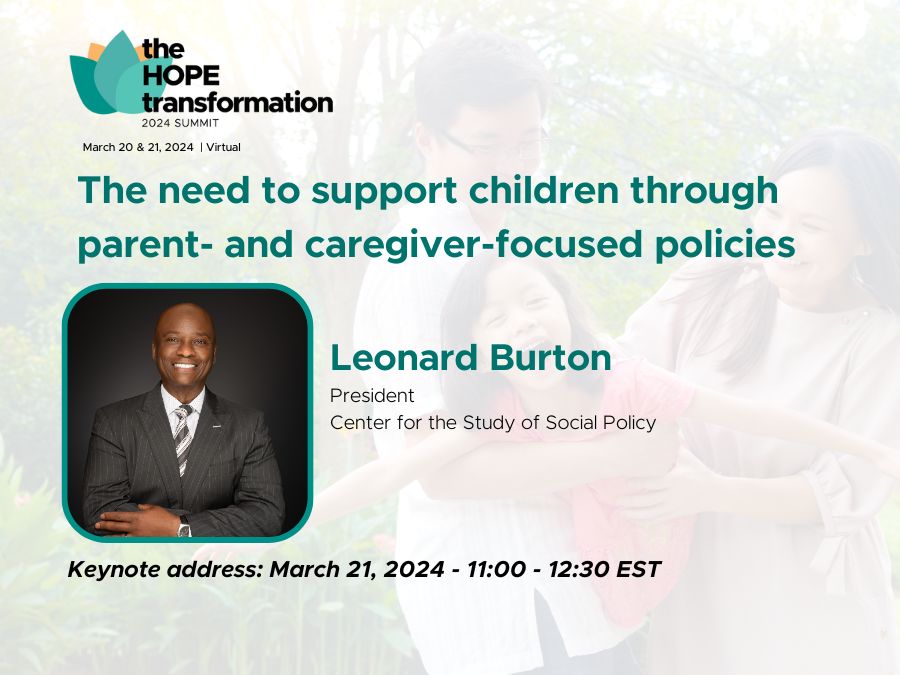
The HOPE National Resource Center proudly partners with the Center for the Study of Social Policy (CSSP) to advance health and well-being for children, families, and communities. We welcome Leonard Burton, President of CSSP, as our keynote speaker at the Fourth Annual HOPE Summit – The HOPE Transformation. He will present The Promises of HOPE: Building a World that Centers the Positive on Wednesday, March 20 from 11:00 AM – 12:00 PM ET.
Below Burton shares CSSP’s work on anti-racism practices in policy settings to lessen barriers to positive childhood experiences through trusting and supporting parents.
Uplifting the strengths of parents and caregivers
CSSP [Center for the Study of Social Policy] believes that in order to create a society in which all children, youth, and families have what they need to pursue their goals and thrive, we need to redress how racism has shaped policy and systems—historically and through to the present—to systematically disadvantage people…
Behind every child who is growing and thriving, and behind every community that is strong and flourishing, are parents and caregivers whose love and devotion and unceasing work make this all possible. But too often policymakers have pathologized parents—suggesting something is wrong with them and that they are not deserving or capable of caring for their children without surveillance and outside intervention. This well-worn narrative is rooted in long history of anti-Black racism, going back to slavery, and has produced public policies and systems that do not effectively support families and actively cause them harm.
This is why at the Center for the Study of Social Policy (CSSP) we take an anti-racist approach to our work. CSSP believes that in order to create a society in which all children, youth, and families have what they need to pursue their goals and thrive, we need to redress how racism has shaped policy and systems—historically and through to the present—to systematically disadvantage people based on their race and other intersecting identities, including sexual orientation and gender identity, ability, immigration status, and caregiving status.
Developing policies that trust and support parents and caregivers
We have seen how transformative it can be when policymakers place their trust in parents and caregivers and give them the freedom and resources to make meaningful choices about how to raise their children.
While dismantling racist policies and systems we also need to work with parents and caregivers to develop policies that are responsive to their needs, as they see them and express them, and ensure that every family can be together, have opportunities for good health, and afford the necessities and pursue their goals.
In CSSP’s work over the last several years, we have seen how transformative it can be when policymakers place their trust in parents and caregivers and give them the freedom and resources to make meaningful choices about how to raise their children.
During the COVID-19 pandemic, we saw the role of intrusive and controlling systems like child protective services shrink, as mandated reporters were no longer routinely surveilling families and fewer children were placed in foster care. Meanwhile children remained safe. We didn’t see an increase in hospitalizations, substantiated abuse, or any other risk metric.
At the same time, Congress passed COVID relief measures that provided timely, meaningful support to parents and caregivers that helped to reduce economic stress and enable parents to fulfill their vision for how they would like to raise their children.
As an example, the American Rescue Plan temporarily strengthened the Child Tax Credit (CTC) in 2021, increasing the benefit levels to up to $3,600 per child, distributing the benefit on a monthly basis, and making families with the lowest incomes eligible for the full credit for the first time. The expanded Child Tax Credit (CTC) kept 5.3 million people out of poverty in 2021, and by providing a regular cash payment to parents and caregivers, it reduced parental stress and gave parents the flexibility to meet their families’ needs as they changed from month to month—for example, buying school supplies and clothes in August and covering the rising cost of food and gas in December.
We owe families freedom and flexibility
We know that these broad-based economic supports that give parents and caregivers the freedom and flexibility to meet their families’ changing needs, along with voluntary and responsive services that support families at times of heightened need, such as when welcoming a newborn into the family, are what families deserve. In a nation with the wealth and resources of the United States, they are what we owe families.
But time and again, we have failed to make long-term investments in these critical supports. As we saw just two years ago, Congress let the successful CTC expansion expire, causing immediate hardship and leaving many families with children scrambling to figure out how to pay the bills.
Our collective work to shift the narrative and recognize the enormous contributions parents and caregivers make to their families and communities is more important than ever. CSSP is thrilled to partner with Healthy Outcomes from Positive Experiences (HOPE) and practitioners across the country who see the strengths in parents and caregivers and value their indispensable work that enables all of us to flourish together.
Join Leonard Burton at the 2024 HOPE Summit
The Fourth Annual HOPE Summit will take place virtually on March 20 and 21, 2024. The Summit is for all who want to learn more about how positive childhood experiences (PCEs) and the HOPE framework support children’s growth into healthy adults. This year’s goal and theme – The HOPE Transformation – is to support organizational transformation and the adoption of the HOPE framework. Summit participants will learn about the Six Standards of HOPE and the new HOPE-Informed Organizational Certification program.
The Summit features two keynote addresses, a panel discussion, three sessions of workshops, networking opportunities, and more. Workshops and presentations are led by leaders in their field who are using HOPE in their own work. You will leave the event with concrete examples of how to begin practicing HOPE in your own work with children and their families.


